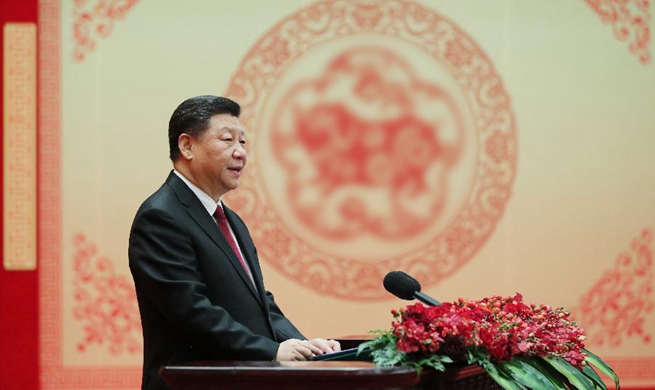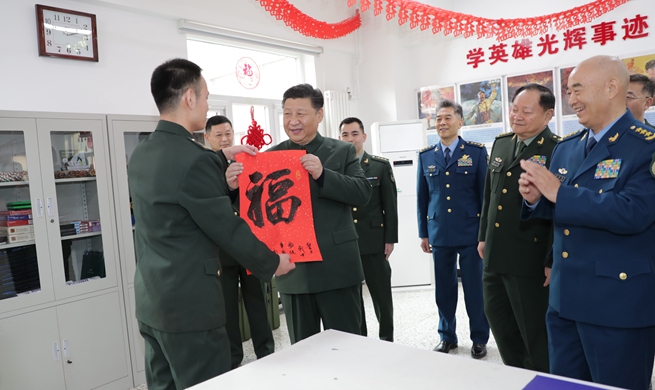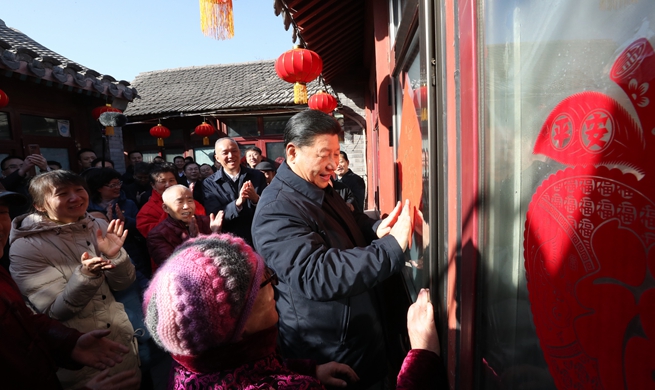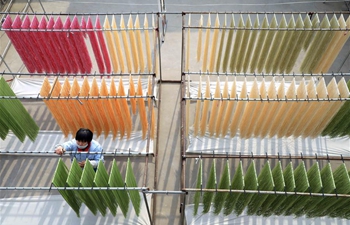NICOSIA, Feb. 5 (Xinhua) -- A new system designed to circumnavigate U.S. sanctions and facilitate trade between Iran and the European Union (EU) could exacerbate an already fragile relationship between Brussels and Washington.
When U.S. President Donald Trump slapped tough economic sanctions on Tehran last year, he also succeeded in widening a rift with the EU over a landmark nuclear accord.
EU'S MECHANISM
Brussels was horrified, and maintained that preserving the Joint Comprehensive Plan of Action (JCPOA) was "a matter of respecting international agreements and of advancing our shared regional and international security." However, pulling out of the 2015 agreement was a major election campaign promise for Trump, who repeatedly described it as "the worst deal ever."
Now, in a move certain to irritate Washington, Brussels has rolled out a so-called Instrument in Support of Trade Exchanges (INSTEX) in the hope of enabling European businesses to continue to trade with Iran and save the nuclear deal.
On paper, the system looks basic. Using a barter system for non-sanctionable goods, the idea is to deal directly with Tehran, thus bypassing the international banking network dominated by the U.S. dollar and avoiding the sanctions.
While some analysts believe the scheme could prove useful to small and medium-sized businesses that don't trade with the United States, big business will probably give it wide berth to avoid the wrath of Washington.
The dispute has again highlighted the power of the U.S. dollar in international trade and led to increased calls for European economic autonomy. The debates have been amplified amid accusations that Washington is stamping its foreign policy on Europe, thus worsening a relationship already reeling from a trade war and NATO spending row.
For their part, U.S. officials have dismissed INSTEX, doubting it will have any tangible impact on sanctions that ban Iran from using the U.S. dollar and trading in metals, cars and coal. American businesses trading in pistachio nuts, Iranian carpets and caviar had their licenses stripped. Iran was also barred from purchasing new aircraft to replace their antiquated civilian fleet. Boeing had to abandon plans to supply more than 16 billion U.S. dollars in passenger jetliners to Iran. A second raft of sanctions, imposed in November 2018, targeted its oil and gas trade.
TEST FOR NEW IDEA
But the real test for the INSTEX scheme will consequentially come from Iran itself. So far, the signs are not promising.
Critics inside Iran describe a "mechanism with limited capacity" not for exchanging money but for pharmaceuticals and food supplies. They assert traditional trade to prop up the faltering economy is essential, as inflation skyrockets and the value of the Saudi riyal sinks. Meanwhile, the unemployment indicator in Iran continues to rise.
However, despite the lukewarm response, the EU hopes the new mechanism will keep Tehran in the nuclear deal by preserving some of the economic benefits it received.
PROLONGED DISPUTE
Europe had made it no secret that it openly disagrees with sanctions on Iran and signaled last year that they wanted to preserve the nuclear deal, with or without U.S. involvement.
Despite that, Washington reinstated stringent sanctions, accusing Tehran of continuing to pursue nuclear weapons, a charge Iran denies. For their part, Iranian officials insist that there has been no violation of the 2015 pact with the United States, China, Britain, France, Germany and Russia, which curbed its nuclear enrichment program in exchange for relief from economic sanctions.
The United States withdrew from the accord last May.
In the past, Iranian President Hassan Rouhani described the sanctions as "psychological warfare" aimed at sowing division among Iranians.
As it stands, Britain is keen to stress that INSTEX will not hurt London's diplomatic relationship with the United States, which in view of Brexit next month is taking on increasing importance.
Right now, it is too early to gauge how INSTEX will impact on EU-Iranian economic ties, as the scheme will not begin operations until late in 2019. However, it highlights that despite the noblest intentions of Brussels, EU economic sovereignty remains in the shadow of the U.S. dollar.













